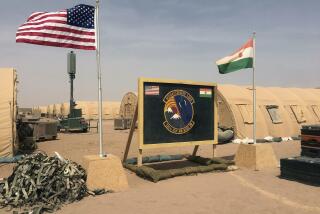U.N. Presses U.S. for Troops to Help End Liberia’s Civil War
- Share via
UNITED NATIONS -- The U.N. Security Council met in emergency session Monday to pressure the United States to lead a military intervention in Liberia, but despite the mounting pressure from U.N. and African officials, Washington had not yet made a decision.
Secretary-General Kofi Annan called over the weekend for a multinational force to prevent more bloodshed in the West African nation.
He reinforced his message Monday in Geneva, saying that the U.S. has special responsibility for the country, which was founded by returned American slaves in 1847.
“There are lots of expectations that the U.S. may be prepared to lead this force,” he told reporters. “Of course, that is a sovereign decision for them to take, but all eyes are on them.”
President Bush is planning to travel to Africa for five days on Monday, and a group of African leaders meeting with U.N. Security Council ambassadors in Ghana offered 3,000 troops if the U.S. would add 2,000 more to quell Liberia’s three-way civil war. They said they hoped for a commitment before Bush leaves.
Fighting between rebels and forces loyal to President Charles Taylor have thrown Liberia into chaos, and caused nearly a third of the population -- about 1 million people -- to stream into the capital, Monrovia, seeking refuge, Annan said.
Taylor has refused the conditions of a recent cease-fire agreement requiring him to step down by July 17, sparking a fresh round of fighting and looting in Monrovia. Last week, Bush echoed the call for Taylor to resign.
In Washington, Defense Secretary Donald H. Rumsfeld said the Bush administration was “looking at a range of options” in Liberia but had made no decision on sending troops.
The Security Council has given the administration some breathing room by deferring discussions of a multinational intervention until after council ambassadors return from a fact-finding mission to West Africa.
The U.S. hasn’t engaged significant forces in Africa since 18 U.S. Army Rangers were killed in Somalia in 1993.
Last month, a U.S. amphibious assault ship returning from Iraq, the Kearsarge, was diverted to stand by off Liberia’s coast to help evacuate civilians -- or possibly send Marines ashore to help restore order -- but returned to the United States after the June 17 cease-fire agreement.
U.N. officials said the United States seems ambivalent about getting directly involved in Liberia but that they detect a growing willingness in Washington to cooperate with United Nations and African forces in the region.
On Saturday, a rescue operation swept nearly 50 American and European diplomats and aid workers out of Monrovia on U.N. aircraft.
The U.S. had asked to borrow helicopters from a peacekeeping force in nearby Sierra Leone, but the request was turned down because Monrovia was deemed too dangerous.
“No one wants to see another ‘Black Hawk Down,’ ” said a U.N. official, referring to the disastrous 1993 mission in which a U.S. helicopter was shot down in Somalia. However, a lull in the fighting Saturday allowed workers to be taken out by U.N. planes.
More to Read
Sign up for Essential California
The most important California stories and recommendations in your inbox every morning.
You may occasionally receive promotional content from the Los Angeles Times.













